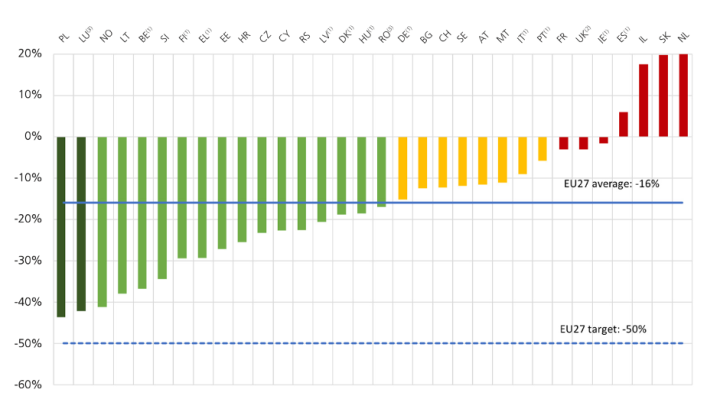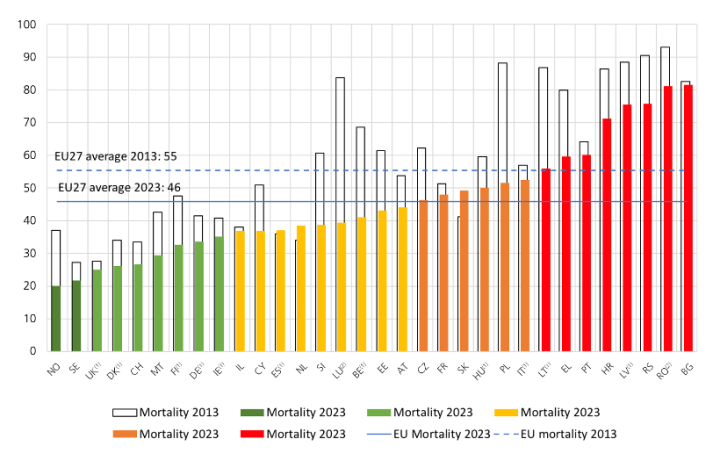Finland Wins European Transport Safety Council’s Road Safety Prize for 2024
Finland is the recipient of the 2024 European Transport Safety Council prize for outstanding progress in road safety.
The country reduced road deaths by a substantial 29% over the decade to 2023, while the average decline in the EU was just 16%.
The accolade, known as the Road Safety Performance Index (PIN) award, recognises Finland’s progress in road safety and is a testament to the country’s long-term targets and comprehensive strategy for improving the road safety of all road users.
Antonio Avenoso, Executive Director of the European Transport Safety Council said:
“In Finland, they say ‘vahinko ei tule kello kaulassa’ which roughly translates as ‘accidents don’t come with a bell around their necks’. That may explain why the Finnish take such a comprehensive and strategic approach that seeks to cover many different aspects of road danger. The effort doesn’t end when crashes happen either; Finland is the only country in Europe that does an in-depth investigation of every single fatal collision. We congratulate Finland on their progress over the last ten years, and hope they will be inspired to redouble their efforts to reach their ambitious targets for the future.”
EU progress on cutting road deaths stagnated in 2023
The announcement coincides with new analysis published today by ETSC which shows there were 20,418 deaths on EU roads last year. This represents a decrease of only 1% compared to 2022, falling far short of the 6.1% annual reduction needed to achieve the EU target of a 50 % reduction by 2030.
Following European elections last week, ETSC is calling for the establishment of an EU road safety agency, with specific powers such as managing the roll-out of automated vehicles, and carrying out crash investigations. While the other main transport modes in Europe (aviation, maritime and rail) have dedicated EU agencies responsible for safety, there is no such agency for road transport.
ETSC is also urging the European Commission to start work on a new revision of vehicle safety regulations to account for rapidly advancing safety technologies and to push ahead with reforms to periodic technical inspections of vehicles to ensure these technologies are maintained over a vehicle’s lifetime.
Commenting on the next five-year mandate of the European Parliament and Commission, Mr Avenoso commented:
“Road safety needs to be a priority once again. 100,000 people died on EU roads over the last five years, and 100,000 more will die over the next five if nothing changes. The newly elected MEPs and appointed Commissioners must hit the ground running.”
Road safety in Finland
Finland’s current Traffic Safety Strategy is guided by Vision Zero, i.e. that by 2050, no one should die or be seriously injured on the road, regardless of the mode of transport.
Since 2000, Finland has implemented several important measures to improve road safety. These include lower speed limits in most urban areas, construction of pedestrian and bicycle paths, construction of 400 km of motorways, installation of automatic speed cameras on nearly 3,000 km of main roads.
Finland’s National Traffic Safety Strategy 2022–2026 aims to improve the traffic skills of different road users and different age groups comprehensively. The strategy includes two indicators aimed at the road safety of children: the proportion of schools that have traffic education as part of their year plan; and the number of collisions involving a child or young person.
Finland’s National Mental Health Strategy and Programme for Suicide Prevention 2020–2030 will also contribute to improving road safety for road users of all ages, as in Finland prioritising mental health is another element strongly linked to traffic safety. Finland is one of only two EU countries to include suicides on the road in road death statistics (the other is Estonia). Finland’s road death statistics are therefore higher than they would be if these deaths were excluded as in other countries.
Finland reports motorcycle and moped helmet-wearing rates of between 99-100%. The police are allowed to make random alcohol and drug tests for drivers.
Self-reported drink-driving is much lower than the EU average and acceptance towards drink-driving is generally very low. Alcohol interlocks must be fitted in all school coaches and school taxis in Finland. The devices are also installed in the vehicles of convicted drink-drivers as part of a long-running rehabilitation programme used as an alternative to a driving ban.
Download the report at:
Follow ETSC on X @etsc_eu and LinkedIn. #PIN2024

Relative change in road deaths between 2013 and 2023. See report page 16.

Mortality (road deaths per million inhabitants) in 2023 (with mortality in 2013 for comparison). See report page 21.
Road deaths per million population over time 2001-2023








